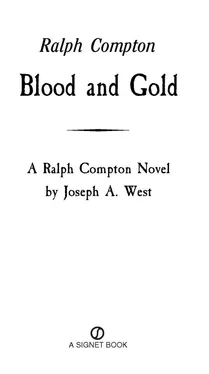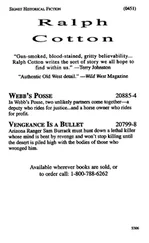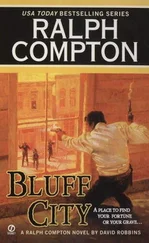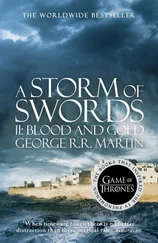I stepped over to the bunkhouse but the place was dark, so I turned on my heel and began to make my way back to the house again.
I’d only gone a few yards when I heard a muffled footstep behind me. I turned quickly, drawing the Colt from my waistband.
Jim Meldrum stood there, two well-worn revolvers in shoulder holsters hung on each side of his narrow chest.
The man made no move toward his hardware but gave me one of his rare smiles, his teeth showing white in the darkness under his mustache. “Fast, Dusty. Mighty fast and smooth.”
I lowered the Colt, letting out my pent-up breath in a relieved hiss. “Hell, Jim, you scared me out of a year’s growth,” I said.
Meldrum nodded. “Sorry about that. But Deke Stockton hasn’t come in yet, and that’s a worrisome thing.”
“I thought you’d hung up your guns forever, Jim,” I said. I’d never seen Meldrum wear his Colts before, but he looked like he was born to them, as though they were an essential part of him.
The lanky puncher shrugged. “Like you, like Deke, I ride for the brand. I’ve been thinking things over, and if there’s shooting to be done, and killing, I’ll do it. I may not like it, but I’ll do it.”
Like every puncher I ever knew, Meldrum’s first loyalty was to the ranch, but you don’t buy devotion like that for forty a month. To a man like Meldrum, the ranch was not an area of land, of pastures, rivers and forests, but a principle and a way of life. He believed in that principle and that way of life and held the unshakable opinion that it was worth preserving, worth fighting for and even worth dying for. This was the wellspring of his loyalty and what sustained it through good times and bad. Had Meldrum thought otherwise, he would have been spitting on his own life and mine, rendering them both pointless, useless, without reason or purpose.
“Well, I got to get back to the house,” I said finally. “Mr. Fullerton will be powerful mad if I don’t show up for my grub.”
“One more thing, Dusty,” Meldrum said, taking a step closer to me. “A word of warning: Lafe Wingo, the man you were telling us about, won’t let go of thirty thousand so easily.”
“You know him?”
“I know him. Seen him work one time up in Den ver. He’s good with a gun, maybe the best there is around.”
My fingers strayed to my wounded shoulder. “I can testify to that.”
“Just step carefully and keep your eyes open. Wingo will come here, to the SP, depend on it.”
“Jim, you’ll stand with me if that happens?”
“ When it happens.” Meldrum glanced up at the threatening sky, rain falling on the sharp planes of his hard-boned face. Then he lowered his head and looked at me, his eyes bleak. “I’ll stand with the SP Connected, Dusty. But there’s something you ought to know: I’m handy with a gun my ownself, but I’m not near good enough to shade Lafe Wingo.” His cold gray eyes probed mine, searching deep. “Are you?”
I tried to make light of it and grinned. “I wasn’t the last time we met.”
Meldrum didn’t smile in return. “Then best you get in some practice.” His face was drawn, his mouth pinched. “I’ve a feeling you’re going to need it.”
The rain was falling harder as I walked back to the house, Meldrum’s warning lying heavy on me. I felt tight and strange inside, knowing that the last thing I wanted was to meet Lafe Wingo in another gunfight.
Now that Ma had the thirty thousand and the ranch could get out from under the bankers, I’d thought the entire affair with all its blood and death was over. But if Meldrum was right, it wasn’t over . . . not by a long shot.
It was just beginning.
When I stepped into the parlor, Ma and Lila sat on each side of a burning log fire, each holding a dainty cup and saucer in her hands.
Ma, who had retained much of the frugality of her early, hardscrabble years, had kept every dress she’d ever owned, at least those that weren’t too worn-out. Lila was wearing a gown of pale blue gingham that Ma must have bought when she was younger and a lot slimmer, and the girl’s black hair was pulled back from her face with a bow of darker blue.
The sight of her made my breath catch in my throat and as I sat on the chair that Ma indicated, I heard my heartbeat hammer in my ears.
Lila Tryon wasn’t just pretty like Sally Coleman. She had a dark, flashing beauty that Sally could never match, the kind that made a man look twice . . . and then, all unbelieving, look again.
“Dusty,” Ma said, after I’d finally settled into my chair, “Lila tells me she wants to get to her ranch as soon as possible.”
Before I could answer, Lila said quietly and insistently: “It’s a farm, Mrs. Prather.”
Ma smiled at the girl. “Lila, you must call me Ma—everyone else does.” Then, revealing her natural prejudices as a cattleman’s wife, she added, maybe a little too sweetly: “This is ranching country, my dear.”
Lila opened her mouth to speak, but I jumped in quickly to keep the peace. “Ma, I already told Lila she can’t go to her . . . place until the Apaches are rounded up.”
Ma nodded, brushing a strand of gray hair away from one red apple cheek. “That dreadful Victorio, I’ll be so glad when the army finally catches him.” She looked at me, her brownish-green eyes troubled. “Dusty, did you hear about Tom Jurgunsen?”
I nodded. “Uh-huh. Mr. Fullerton told me.”
As if she hadn’t heard, Ma continued. “Tom gone, and his handsome young son, and Betty not expected to live. It’s just so terrible.”
Hooves sounded outside and Ma glanced toward the window. “That must be Deke. I sent him out to scout around for any sign of Apaches.” She rose to her feet and laid her cup and saucer on the table. “I’ll go hear what he has to tell me.”
I was about to say I’d join her, but the door opened and Charlie walked in, holding a tray heaped high with food. “Ah,” Ma said, “and here’s Mr. Fullerton just in time.” She studied the tray closely, nodded her approval and said: “Eat hearty, Dusty. I’ll be back soon.”
The food was good and I was hungry and for a while the only sound was the clink of my fork on the plate. Finally, after eating most of two steaks, seven eggs and several slabs of bread, I had to admit defeat. I sighed and placed the tray on the table beside me.
“Did you enjoy that?” Lila asked, one eyebrow arching.
“Sure did.”
“I’ve never seen one man eat so much.”
I smiled at her. “What did you eat, Lila?”
“Why, I”—she hesitated—“well, not nearly as much as you did, I can tell you that.” Lila looked at me, frowning a little. “Dusty, I meant what I said when I told Ma I want to go to my own place. It’s the end of one journey for me, and the beginning of another that I’m anxious to start. I can’t stay here dependent on Ma’s charity.”
“Lila, it’s not charity. Ma will love having you here. She never had any children her ownself and she’ll treat you like a daughter.”
Lila nodded. “She already has. But I still want my own home.”
I rose to my feet, needful of a smoke, knowing tobacco in any form was another thing Ma would not tolerate in the house. “I’ll go talk to Deke Stockton. If he didn’t come across any Apache sign, maybe we can ride out to your place tomorrow.”
Lila rose and came into my arms. “Thank you, Dusty. It will mean so much to me.”
I kissed her lightly on the cheek, then stepped outside and walked to the bunkhouse, Lila’s warm woman smell still lingering in my consciousness.
When I stepped inside, Deke was sitting on a bunk, smoking. I looked around and saw that Jim had already moved in pretty Sally Coleman’s very much battered and torn Dodge City bonnet, my blanket roll, yellow slicker and booted Winchester.
Читать дальше





